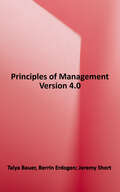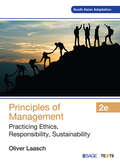- Table View
- List View
Principles of Macroeconomics, 3e
by David Shapiro Daniel Macdonald Steven A. GreenlawPrinciples of Macroeconomics 3e covers the scope and sequence of most one-semester introductory macroeconomics courses. The third edition takes a balanced approach to the theory and application of macroeconomic concepts. The text uses conversational language and ample illustrations to explore economic theories and provides a wide array of examples using both fictional and real-world scenarios. The third edition has been carefully and thoroughly updated to reflect current data and understanding, as well as to provide a deeper background on diverse contributors and their impacts on economic thought and analysis. For example, the third edition highlights the research and views of a broader group of economists. Brief references and deeply explored socio-political examples have also been updated to showcase the critical – and sometimes unnoticed – ties between economic developments and topics relevant to students.
Principles of Macroeconomics, Aplia Edition (6th Edition)
by N. Gregory MankiwThis book "Principles of Macroeconomics, Aplia Edition" contains nine parts covering topics on: The Real Economy in the Long Run, Money and Prices in the Long Run, The Macroeconomics of Open Economies, Short Run Economic Fluctuations, and Final Thoughts.
Principles of Macroeconomics: Activist vs Austerity Policies
by Howard Sherman Michael A MeeropolPrinciples of Macroeconomics by Howard J. Sherman and Michael A. Meeropol differs from other texts in that this book stresses far more the inherent instability of the macro-economy. The details of the business cycle come early and are integrated throughout the core of usual macro topics (C, I, G, X). The book puts inflation into its proper perspective by recognising that unemployment is the much greater threat to the economic well being of the vast majority of the people. Instead unemployment and its human toll are given far greater emphasis than other texts. The Keynesian model is fully developed; so is the statistical analysis of Wesley Mitchell. The neoclassical model is covered in both its historical evolution and in its implications for current policy debates. Finally, there is strong coverage of the Euro-zone crisis and its linkages to the United States.
Principles of Macroeconomics: Activist vs. Austerity Policies
by Howard J. Sherman Michael A. Meeropol Paul D. ShermanIn the years since 2007 the U.S. economy has endured a severe financial crisis, a Great Recession, and continuing heavy unemployment. These events have led to increasing discontent among many people contributing to a substantial vote for Bernie Sanders and the election of Donald Trump. Meanwhile, Europe has witnessed the rise of nationalist parties and Brexit. In the face of these problems and events, economics must change. Principles of Macroeconomics: Activist vs. Austerity Policies provides an antidote to the standard macro texts offering multiple points of view instead of one standard line, a fact-based focus on the causes and cures of instability in economics, and an examination of inequality in the United States. Readers are introduced to both the Classical view, which takes the conservative approach and argues for an austerity program to reduce the size of the government; and the Progressive view, which argues for government intervention to create a strong recovery. These ideas are applied to all the key macroeconomic topics including economic growth, business cycles, and monetary policy. Using the methodology of Wesley Mitchell and drawing on the work of Keynes, the authors also explore topics such as unemployment, the human cost of economic crashes, increasing inequality of income, and the history of capitalism. This second edition includes new material on the Obama recovery, the crisis in the Eurozone, the rise of populism, and the current state of healthcare, education, and environmental issues in America to bring the text fully up to date. It will be of great interest to undergraduate students and particularly those studying the economics of the United States.
Principles of Macroeconomics: COVID-19 Update
by Dirk Mateer Lee CoppockStudents and instructors are living through a pandemic that has changed how and what they teach, and how and where they learn. The COVID-19 Update of Principles of Economics, Third Edition, provides the information that students need to make sense of the impacts COVID-19 has had on the economy. The Update Edition has been completely revised to include new examples, new data, new policies, and more. All of Norton’s digital resources fully integrate with most learning management systems, providing the flexibility instructors need in this changed world.
Principles of Macroeconomics: Second Edition
by Dirk Mateer Lee CoppockWritten by professors of microeconomics and macroeconomics at the University of Arizona and the University of Virginia. These professors have brought their innovative teaching experiences to this blockbuster text. They put economics into context by making it relateble through carefully crafted real-world examples, a problem-solving pedagogy that emphasizes economic decision-making, and a voice that speaks directly to students.
Principles of Management
by Talya Bauer Mason Carpenter Berrin ErdoganPrinciples of Management by Carpenter, Bauer and Erdogan teaches management principles to tomorrow's business leaders by weaving three threads through every chapter: strategy, entrepreneurship and active leadership. Strategic: All business school teachings have some orientation toward performance and strategy and are concerned with making choices that lead to high performance. Principles of Management will frame performance using the notion of the triple bottom-line the idea that economic performance allows individuals and organizations to perform positively in social and environmental ways as well. The triple bottom line is financial, social, and environmental performance. It is important for all students to understand the interdependence of these three facets of organizational performance. The Entrepreneurial Manager: While the General Management course at Harvard Business School was historically one of its most popular and impactful courses (pioneered in the 1960s by Joe Bower), recent Harvard MBAs did not see themselves as general managers. This course was relabeled 'The Entrepreneurial Manager' in 2006, and has regained its title as one of the most popular courses. This reflects and underlying and growing trend that students, including the undergraduates this book targets, can see themselves as entrepreneurs and active change agents, but not just as managers. By starting fresh with an entrepreneurial/change management orientation, this text provides an exciting perspective on the art of management that students can relate to. At the same time, this perspective is as relevant to existing for-profit organizations (in the form intrapreneurship) as it is to not-for-profits and new entrepreneurial ventures. Active Leadership: Starting with the opening chapter, Principles of Management show students how leaders and leadership are essential to personal and organizational effectiveness and effective organizational change. Students are increasingly active as leaders at an early age, and are sometimes painfully aware of the leadership failings they see in public and private organizations. It is the leader and leadership that combine the principles of management (the artist's palette, tools, and techniques) to create the art of management. Cases: Mason provides brief cases in his Instructors Manual for those who take a case approach to the course or who wish to incorporate cases. This book's modular format easily maps to a POLC course organization (Planning, Organizing, Leading, and Controlling, attributed to Henri Fayol (1949, General and industrial management. London. Pitman Publishing company), and suits the needs of most undergraduate or graduate course in Principles of Management.
Principles of Management
by OpenStaxPrinciples of Management is designed to meet the scope and sequence requirements of the introductory course on management. This is a traditional approach to management using the leading, planning, organizing, and controlling approach. Management is a broad business discipline, and the Principles of Management course covers many management areas such as human resource management and strategic management, as well as behavioral areas such as motivation. No one individual can be an expert in all areas of management, so an additional benefit of this text is that specialists in a variety of areas have authored individual chapters.
Principles of Management (Innovative Business Textbooks)
by Tony MordenAn established work, the second edition of Principles of Management offers the reader insight and analysis of the principles, processes and practice of management and leadership. Covering private, public, and not-for-profit sectors, the book also takes an international approach, with a dedicated section on globalised processes and styles of management. The content is broken down into accessible sections to provide a clear and user-friendly book. Written to meet the criteria of practicality and professionality, the book is relevant and useful with an emphasis on capability, usability, decision and resolution; "fix"; and an orientation towards implementation.
Principles of Management Version 2.0
by Talya Bauer Mason Carpenter Berrin Erdogan Jeremy ShortPrinciples of Management has been thoroughly updated, and in this edition, you’ll find a new author, a new look and feel, new content, and new as well as updated end-of-the chapter cases. One reviewer of our revision said the following about the addition of our new pages and images: “I will tell you that the addition of pictures in this edition is brilliant! I compared this text to the previous one (page by page)... the pictures truly help bring the "black and white" pages to life!”
Principles of Management Version 4.0
by Talya Bauer Jeremy Short Berrin ErdogenPrinciples of Management covers all of the traditional topics in an introductory management course. The authors teach management principles to tomorrow's business leaders by weaving three threads through every chapter: strategy, entrepreneurship, and leadership. It is a concise, accessible, and engaging text that communicates the latest findings and best practices related to mastering the principles of management.
Principles of Management for the Hospitality Industry
by Dana V TesoneIt is vital for hospitality management students to understand key management concepts as part of the complex and intimate nature of the services industry. Principles of Management for the Hospitality Industry is designed specifically for hospitality students who need to be able to use management tools and techniques to become successful hospitality managers. By placing you at the heart of an imaginary workplace this book offers the opportunity to work through all of the items of discussion for each topic. The chapter begins with a scenario to prompt an exploration of a given topic, and concludes with the outcome of this scenario to reinforce the lessons learnt throughout the chapter. Highly practical in approach, this is an up-to-date and skilful integration of all core areas of management. It is packed with tools and techniques to aid learning and understanding: improve your professional management vocabulary with definitions in each chapter, and a complete glossary of terms visualize key concepts with over one hundred explanatory diagrams gain confidence by testing your understanding on the accompanying website practical applications of theory are illustrated in international case studies throughout the book discussion questions prompt an exploration of key concepts.
Principles of Management: Custom Edition for the University of Houston
by Chuck Williams James Campbell Quick Debra L. Nelson"This custom edition for the University of Houston is a compilation of MGMT 8 written by Chuck Williams and ORGB 4 written by Nelson & Quick. "
Principles of Management: Practicing Ethics, Responsibility, Sustainability
by Oliver LaaschAn invaluable textbook for aspiring and practicing managers who want to create a 21st century business that is ethical and sustainable Principles of Management: Practicing Ethics, Responsibility, Sustainability places humanity, positivity and the world instead of profit at the center of its understanding of management principles. This fully revised edition maintains the intention of the first edition to re-think the idea of management in the face of modern world crises. It has been updated with three brand new chapters on communicating, innovating and leading. This accessible and engaging textbook will help students to become responsible and ethical managers ready for the 21st century workplace, armed with essential workplace skills. This textbook also includes coverage of the UN's Sustainable Development Goals (SDGs) which are central to business education and practice. Key Features: • Updated with the latest developments in professional management • Exclusive interviews with management pioneers and professionals • All new case studies including Lego, Patagonia and Greta Thunberg • Worksheets and exercises that make for an active learning experience
Principles of Management: Practicing Ethics, Responsibility, Sustainability
by Oliver LaaschNow, more than ever, there is widespread understanding that business and management must move with the times and act responsibly in the world giving full consideration to people and planet, not just profit. Principles of Management: Practicing Ethics, Sustainability, Responsibility was the first official textbook of the United Nations global initiative network, Principles for Responsible Management Education (PRME). Now fully revised and updated with three brand new chapters on communicating, innovating and leading, this accessible and engaging textbook provides an introduction to management while empowering you to think ethically and sustainably in order to become a responsible manager. It also includes essential workplace skills for the 21st century and coverage of the various management occupations that you will go on to fill after your studies. Exclusive interviews with management pioneers and professionals help bring theories and concepts to life throughout the text as do the all new case studies which include Lego, Patagonia and Greta Thunberg. Worksheets and exercises make for an active learning experience in the supporting online resources. It includes coverage of the UN’s Sustainable Development Goals (SDGs) which are central to business education and practice today. The textbook can be used for introductory management courses as well as courses that cover business ethics, business and society, corporate social responsibility (CSR), sustainability and responsible management.
Principles of Management: Practicing Ethics, Responsibility, Sustainability
by Oliver LaaschNow, more than ever, there is widespread understanding that business and management must move with the times and act responsibly in the world giving full consideration to people and planet, not just profit. Principles of Management: Practicing Ethics, Sustainability, Responsibility was the first official textbook of the United Nations global initiative network, Principles for Responsible Management Education (PRME). Now fully revised and updated with three brand new chapters on communicating, innovating and leading, this accessible and engaging textbook provides an introduction to management while empowering you to think ethically and sustainably in order to become a responsible manager. It also includes essential workplace skills for the 21st century and coverage of the various management occupations that you will go on to fill after your studies. Exclusive interviews with management pioneers and professionals help bring theories and concepts to life throughout the text as do the all new case studies which include Lego, Patagonia and Greta Thunberg. Worksheets and exercises make for an active learning experience in the supporting online resources. It includes coverage of the UN’s Sustainable Development Goals (SDGs) which are central to business education and practice today. The textbook can be used for introductory management courses as well as courses that cover business ethics, business and society, corporate social responsibility (CSR), sustainability and responsible management.
Principles of Managerial Economics
by Donald N. StengelEconomic principles inform good business decision making. Although economics is sometimes dismissed as a discourse of practical relevance to only a relatively small circle of academicians and policy analysts who call themselves economists, sound economic reasoning benefits any manager of a business, whether they are involved with production and operations, marketing, finance, or corporate strategy. Along with enhancing decision making, the field of economics provides a common language and framework for comprehending and communicating phenomena that occur within a business, as well as between a business and its environment. This text addresses the core of a subject commonly called managerial economics, which is the application of microeconomics to business decisions. Key relationships between price, quantity, cost, revenue, and profit for an individual firm are presented in the form of simple conceptual models. The text includes key elements from the economics of consumer demand and the economics of production. The book discusses economic motivations for expanding a business and contributions from economics for improved organization of large firms. Market price-quantity equilibrium, competitive behavior, and the role of market structure on market equilibrium and competition are addressed. Finally, the text considers market regulation in terms of the generic problems that create the need for regulation and possible remedies for those problems. Although the academic literature of managerial economics often employs abstract mathematics and large corporations create and use sophisticated mathematical models that apply economics, this book focuses on concepts, terminology, and principles, with minimal use of mathematics. The reader will gain a better understanding of why businesses and markets function as they do and how those institutions can function better.
Principles of Managerial Finance (What's New in Finance series)
by Scott Smart Chad ZutterThe Teaching and Learning System—a hallmark feature of Principles of Managerial Finance—weaves pedagogy into concepts and practice, giving students a roadmap to follow through the text and supplementary tools. <p><p>The 15th Edition concentrates on the material students need to know in order to make effective financial decisions in an increasingly competitive business environment. It allows students to make the connections between a firm’s action and its value, as determined in the financial market. With a generous amount of examples, this text is an easily accessible resource for in- and out-of-class learning.
Principles of Managerial Finance Brief, Seventh Edition
by Lawrence J. Gitman Chad J. ZutterThis seventh edition guides students through complex material with a proven learning goal system. This system - a hallmark feature of Principles of Managerial Finance, Brief -weaves pedagogy into concepts and practice, giving students a roadmap to follow through the text and supplementary tools.
Principles of Marketing
by Gary Armstrong Philip KotlerToday’s marketing challenge is creating vibrant, interactive communities of consumers who make products and brands a part of their daily lives. Learn how to create value and gain loyal customers. Kotler/Armstrong is a comprehensive, classic principles text organized around an innovative customer-value framework. Students learn how to create customer value, target the correct market, and build customer relationships. The changing nature of consumer expectations means that marketers must learn how to build communities in addition to brand loyalty.
Principles of Marketing
by Jeff Tanner Mary Anne RaymondThis book is intended for a two-semester course in economics taught out the social sciences or business school.
Principles of Marketing (Sixteenth Edition)
by Gary Armstrong Philip KotlerPrinciples of Marketing Is the most-trusted source for teaching and learning basic marketing concepts and practices. More than ever, the sixteenth edition introduces new marketing students to the fascinating world of modern marketing in an innovative, complete, and authoritative yet fresh, practical, and enjoyable way. In this sixteenth edition, we've once again added substantial new content and poured over every page, table, figure, fact, and example in order to keep this the best text from which to learn about and teach marketing. Enhanced by MyMarketingLab, our online homework and personalized study tool, the sixteenth edition of Principles of Marketing remains the world standard in introductory marketing education.
Principles of Marketing (customized edition)
by Jeff Tanner Mary Anne RaymondThis book teaches the experience and process of actually doing marketing - not just the vocabulary. It carries five dominant themes throughout in order to expose students to marketing in today's environment. This is a customized textbook.
Principles of Marketing 2.0
by Jeff Tanner Mary Anne RaymondPrinciples of Marketing Version 2.0 by Tanner, Raymond and Schuster teaches the experience and process of actually doing marketing - not just the vocabulary. It carries five dominant themes throughout in order to expose students to marketing in today's environment: Service dominant logic - This textbook employs the term "offering" instead of the more traditional First "P" -- product. That is because consumers don't sacrifice value when alternating between a product and a service. They are evaluating the entire experience, whether they interact with a product, a service, or a combination. So the fundamental focus is providing value throughout the value chain, whether that value chain encompasses a product, service, or both. Sustainability; Increasingly, companies are interested in the impact they are having on their local community as well as the overall environment. This is often referred to as the triple bottom line of financial, social, and environment performance. Ethics and social responsibility; Following on the sustainability notion is the broader importance of ethics and social responsibility in creating successful organizations. The authors make consistent references to ethical situations throughout chapter coverage, and end of chapter material in most chapters will encompass ethical situations. Global coverage -- Tanner, Raymond and Schuster deliberately entitled Chapter 1; What is Marketing?; Whether it is today's price of gasoline, the current U.S. presidential race, or Midwestern U.S. farming, almost every industry and company needs strong global awareness. And today's marketing professionals must understand the world in which they and their companies operate. Metrics -- Firms today have the potential to gather more information than ever before about their current and potential customers. That information gathering can be costly, but it can also be very revealing. With the potential to capture so much more detail about micro transactions, firms should now be more able to answer ;well, what this marketing strategy really worth it?; And what is the marketing ROI?; And finally, what is this customer or set of customers worth to us over their lifetime? Principles of Marketing Version 2.0 brings new and updated coverage of new developments in the influence of social media to empower consumers, as well as marketing's use of social media, such as sentiment analysis, mobile marketing, and customer service and complaint tracking, as a communications and promotion channel, just a name a few. Version 2.0 also has an overall increased number of examples, as well as, new discussion questions in every chapter (resulting in at least 10 per chapter). In addition, the textbook's key terms, and repeated concepts have been strategically arranged to make customizing this book with Flat World's MIYO platform even easier.
Principles of Marketing 2.0
by Jeff Tanner Mary Anne RaymondPrinciples of Marketing Version 2.0 by Tanner, Raymond and Schuster teaches the experience and process of actually doing marketing - not just the vocabulary. It carries five dominant themes throughout in order to expose students to marketing in today's environment: Service dominant logic - This textbook employs the term "offering" instead of the more traditional First "P" -- product. That is because consumers don't sacrifice value when alternating between a product and a service. They are evaluating the entire experience, whether they interact with a product, a service, or a combination. So the fundamental focus is providing value throughout the value chain, whether that value chain encompasses a product, service, or both. Sustainability; Increasingly, companies are interested in the impact they are having on their local community as well as the overall environment. This is often referred to as the triple bottom line of financial, social, and environment performance. Ethics and social responsibility; Following on the sustainability notion is the broader importance of ethics and social responsibility in creating successful organizations. The authors make consistent references to ethical situations throughout chapter coverage, and end of chapter material in most chapters will encompass ethical situations. Global coverage -- Tanner, Raymond and Schuster deliberately entitled Chapter 1; What is Marketing?; Whether it is today's price of gasoline, the current U.S. presidential race, or Midwestern U.S. farming, almost every industry and company needs strong global awareness. And today's marketing professionals must understand the world in which they and their companies operate. Metrics -- Firms today have the potential to gather more information than ever before about their current and potential customers. That information gathering can be costly, but it can also be very revealing. With the potential to capture so much more detail about micro transactions, firms should now be more able to answer ;well, what this marketing strategy really worth it?; And what is the marketing ROI?; And finally, what is this customer or set of customers worth to us over their lifetime? Principles of Marketing Version 2.0 brings new and updated coverage of new developments in the influence of social media to empower consumers, as well as marketing's use of social media, such as sentiment analysis, mobile marketing, and customer service and complaint tracking, as a communications and promotion channel, just a name a few. Version 2.0 also has an overall increased number of examples, as well as, new discussion questions in every chapter (resulting in at least 10 per chapter). In addition, the textbook's key terms, and repeated concepts have been strategically arranged to make customizing this book with Flat World's MIYO platform even easier.














